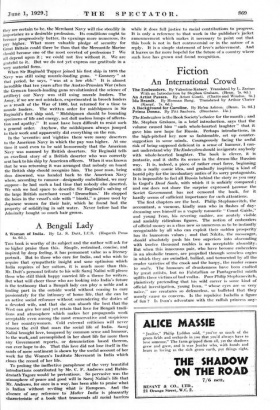A Bengali Lady A. Woman of India. By Lt. S.
Dutt, I.C.S. (Hogarth Press 4s. 6d.).
Tins book is worthy of its subject and the author will ask for no higher praise than this. Simple, restrained, concise, and inspired by deep feeling, it has permanent value as a literary portrait. But to those who care for India, and who wish to acquire that sympathetic insight and sane optimism which India requires of her suitors, it is much more than this. Mr. Dutt's personal tribute to his wife Saroj Nalini will please those who still think happy married life a theme for writers. But what will cheer those who are looking into India's future is the testimony that a Bengali lady can play a noble and a leading part in the outside world without ceasing to care passionately for the intimacy of home life, that she can be an active social reformer without surrendering the duties of a devoted wife, and that she can absorb the best that the West can give her and yet retain that love for Bengali tradi- tions and atmosphere which makes her propaganda work acceptable even among the most conservative and suspicious of her countrywomen. Cold external criticism will never remove the evil that mars the social life of India. Saroj Nalini brought love, tempered by common sense and humour, to the work, and accomplished in her short life far more than any Government reports, or denunciation based thereon, can ever hope to do. That this love did not lose itself in the sands of mere sentiment is shown by the useful account of her work for the Women's Institute Movement in India which closes the record of her life.
To prolong the ineffective paraphrase of the very beautiful introductions contributed by Mr. C. F. Andrews and Rabin- drariath Tagore would 'be pretentious. So pervasive was the atmosphere of peace and good will in Saroj Nalinrs life that Mr. Andrews, for once in a way, has been able to praise what is Indian without reviling what is European. And the absence of any reference to Mother India is pleasantly characteristic of a book -that transcends all racial barriers
while it does full justice to racial contributions to progress. It is only a reference to that work in the publisher's jacket announcement which makes it necessary to point out that this book is not in fact controversial or in the nature of a reply. It is a simple statement of love's achievement. And it leaves us tar more hopeful for the future of a country where such love has grown and found recognition.










































 Previous page
Previous page